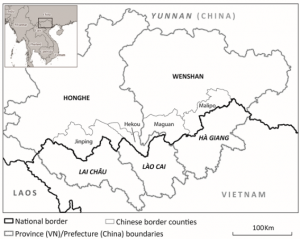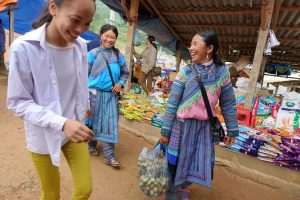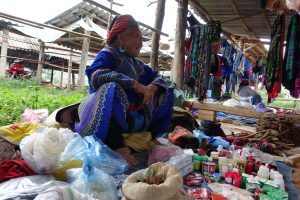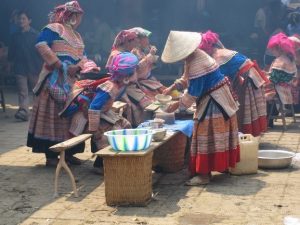LIVELIHOODS FRICTIONS IN THE SINO-VIETNAMESE BORDERLANDS
2018-2023: Funded by the Social Sciences and Humanities Research Council of Canada (Insight programme)
Principal investigator: Prof. Jean MICHAUD, Anthropology, Laval, Canada.
Co-applicant : Prof. Sarah TURNER, Geography, McGill, Canada.
The Sino-Vietnamese borderlands are home to over two million people labelled as members of ‘minority nationalities’. Minority communities in these mountainous uplands have sustained semi-subsistence livelihoods for generations, building upon their detailed knowledge of local ecological systems. These communities are now facing the relentless drive of the socialist states of China and Vietnam to make them more ‘economically efficient’ via agrarian technologies, increasing market integration, and modernization policies. In southern Yunnan province, China, this involves financial and technological support for export crops, while in Vietnam’s northern uplands, hybrid varieties of rice and maize and cash crops are being championed are tourism is catching local officials’ imagination. Meanwhile, environmental pressures are mounting rapidly.
 Yet how do minority populations in these borderlands respond to the numerous frictions caused by this agrarian transition and government policies? How do they design their agricultural livelihood practices? And to what degree do their responses to these frictions reveal strategies to vernacularize globalization and form distinctive life projects?
Yet how do minority populations in these borderlands respond to the numerous frictions caused by this agrarian transition and government policies? How do they design their agricultural livelihood practices? And to what degree do their responses to these frictions reveal strategies to vernacularize globalization and form distinctive life projects?

Our goal is to analyse how particular minority populations in the Sino-Vietnamese borderlands – Zhuang [subdivided into Nùng, Thái, and Tày in Vietnam], Yao [Dao in Vietnam], and Miao [Hmong in Vietnam] – respond to frictions caused by the agrarian transition and government policies, especially in the course of designing their agricultural livelihood practices, and to assess to what degree their responses reveal strategies to adapt global forces and form distinctive life projects.
 This research brings together a multidisciplinary team with expertise in social anthropology, development geography, minority cultures, and land-use change science, from Canada, China, and Vietnam. This team composition is vital to be able to carefully study and interpret how minority individuals and households modify their livelihoods under pressure from political, economic, and environmental sources. We are now expanding our previous research to incorporate five ethnic minority groups in three border provinces in Vietnam, and four counties in Yunnan, China. Our study will draw on in-depth ethnographic fieldwork, documentary analysis, and land-use and land-cover change analysis, while utilising a theoretical framework incorporating insights from agrarian transition and livelihoods, agency and life projects, and borderland studies. We will distribute findings via two multidisciplinary workshops that will help further engagement with upland communities, as well as other groups.
This research brings together a multidisciplinary team with expertise in social anthropology, development geography, minority cultures, and land-use change science, from Canada, China, and Vietnam. This team composition is vital to be able to carefully study and interpret how minority individuals and households modify their livelihoods under pressure from political, economic, and environmental sources. We are now expanding our previous research to incorporate five ethnic minority groups in three border provinces in Vietnam, and four counties in Yunnan, China. Our study will draw on in-depth ethnographic fieldwork, documentary analysis, and land-use and land-cover change analysis, while utilising a theoretical framework incorporating insights from agrarian transition and livelihoods, agency and life projects, and borderland studies. We will distribute findings via two multidisciplinary workshops that will help further engagement with upland communities, as well as other groups.
Based upon our co-creation of knowledge strategies, this research will be a springboard for academics, non-government agencies, local ethnic minority leaders, local government officials, and state policy makers to produce nuanced and culturally appropriate policies and programs to support and empower ethnic minority communities and their dynamic livelihoods in these borderlands, and potentially across other parts of the Southeast Asian Massif.


